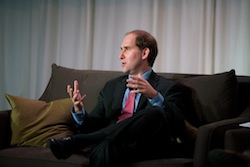By Emily K. Alhadeff , Assistant Editor, JTNews
Former Jewish Funds for Justice President and CEO Simon Greer looked comfortable before the 100 or so people attending his talk on Jan. 24. At 44, Greer is tall, with thinning blonde hair, a square jaw and distinguished jowls. Reclining in the cushy chair supplied by the University of Washington’s Stroum Jewish Studies Program as part of its living-room style social justice series, Greer, in a suit that set him apart as a New Yorker in the South Lake Union setting, spoke to the evening’s theme of “How Can America Move Toward a “˜Just’ Domestic Agenda?” with the energy, cadence and humor reserved for leaders priming themselves for a political bid.
This second of four conversations sponsored by the Jewish Studies Program’s “If I Am Not for Myself, What Am I?: Judaism Confronts Human Injustice” series brought Greer, who is now the president and CEO of the Nathan Cummings Foundation, together with popular UW communications professor and department chair David Domke.
Domke, who is Christian, pushed Greer to explain the dynamics of the American Jewish political spectrum.
“Is there a distinct Jewish identity in the American public sphere?” Domke asked. Is there a litmus test to determine who is “in the club as a Jewish publicly engaged person in the United States?”
Greer explained what he perceives as a shift that has taken place over the last half century. During the Civil Rights movement, for instance, Jews aligned themselves with African Americans for one of three general reasons: The belief in the race struggle; the recognition of the plight of the “stranger in a strange land”; or unity in the struggle to be accepted to the same institutions, like the country clubs that ruled “no blacks, no Jews.”
“Religion is no longer a force for progressivism in our country,” said Greer. In fact, now it’s the opposite. Sometime between the early 1970s and 1990s, a split occurred.
“Those who chose to identify more Jewishly in their public identification tended to then have a more parochial or Israel-focused” political perspective, he said. “And the Jews who opted for a more progressive politics moved away from their Jewish identity.”
Greer himself was raised by parents who fled Orthodoxy, and in fact sent him to Jewish Communist summer camp.
“In the camp Olympics, you know how they have blue versus gray? We did nations in the anti-colonial struggle,” Greer reminisced. “I was on Ivory Coast one year, I was on Vietnam one year…Those are the politics I grew up on.”
Today, another trend is emerging: Taking Jewish practice and spirituality to the public, social activist sphere (such as observing Kol Nidre or Sukkot at an Occupy Wall Street demonstration).
But ultimately, Greer claimed, religion drives conservatism, and one of his goals is to change the tide of American Jewish politics from Israel-focused to America-focused.
“If your last name happens to be Goldstein,” said Greer, “and you get a piece of mail from someone running for office, it probably says “˜Israel’ in really big letters…The dominant strategy is pander to the Jews on Israel.”
Greer cited a poll taken by J Street that revealed some telling results: Eighty-three percent of Jews don’t vote based on Israel alone. Like other Americans, they vote with the economy, education, the environment, and other domestic matters in mind.
Barack Obama “has challenged the portion of our community that has the view that the Israeli government is our friend right or wrong in all circumstances,” said Greer, who spent last winter working closely with the president. “He said that’s not a road to security, nor a road to peace, and so he won’t tolerate it.”
In a whisper, he added: “He’s right.”
But there’s also a gap between Jewish establishments and individuals. The establishments tend to focus on Israel-related issues, while a broad swath of the Jewish population identifies with American issues. It’s a gap he tries to exploit.
Greer said that last July, he helped bring 170 Jewish leaders to the White House for a debriefing on domestic matters.
“It sent shock waves to the organized Jewish community,” he said. “A bunch of upstart groups could take 170 people to the White House, and the organized Jewish community didn’t know about it? Wasn’t asked to make it happen or not make it happen? And they didn’t talk about Israel?”
Greer spent the evening describing his participation with the White House, his take-down of Glenn Beck, and the special place of Jewish values in the American public sphere. Toward the end, Domke asked him to distill his message: “What did you come to tell these people?”
“We’ve decided that we’re a one-trick pony,” said Greer. “It’s about politics in the Middle East. That is what we are going to do. And everything from political strategy to the demographics of the next 50 years to what I believe is our ethical code, tells me that that is the wrong move for the American Jewish community.”
Greer returned several times to the influence of his upbringing, which directed him toward a career in community organizing. He repeatedly invoked the spirit of the American dream.
Will we “help America live up to its original promise? Or will we retreat into our private communities and our private lives and think we can manage the fallout?” he asked. “I think Judaism teaches us again and again to come together for the public solution, not retreat to the private solution. We need more people committed every day to changing the world.”
